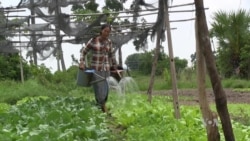Depending on the season, organic vegetable farmer Sem Chantha could be growing spinach, cauliflower, lettuce or collard greens on her six-hectare plot of land in Cambodia’s Kampong Speu province.
While the vast majority of Cambodian farmers grow rice, and to a lesser extent cassava and maize, only about a quarter do so commercially. For those that do sell their wares, very few like Chantha grow vegetables, particularly pesticide-free produce.
“Vegetables can be sold for a higher price than rice and it takes only one and a half months to yield, then it is ready to harvest, while paddy rice take six months to yield,” the 49-year-old farmer said.
“Imported vegetables don’t taste as good as locally grown ones. Like the collard greens — if locally grown, it tastes sweet while the imported ones taste so plain.”
According to a recent study from the World Bank, strong growth in Cambodia’s agriculture sector has helped reduce the number of people living below the poverty line, from 7 million in 2007 to 3 million in 2012. But this growth, driven largely by increased land cultivation for rice farming, has slowed to between 1 and 2 percent in the past two years.
With farmland becoming harder to find, the World Bank says that Cambodian growers need to focus on getting greater yields from their input and diversifying their crops with an eye to increased productivity. The bank says vegetables, for example, fetch returns on average of $1,575 per hectare for small farmers. This compares to $544 per hectare of cassava and $307 per hectare of rice.
Challenges persist
But it’s not as simple as switching seeds.
“[Cambodia’s] vegetable sector has been left largely to poor farmers who lack many things like knowledge, skill, capital, technology and government support,” said Chan Sophal, the director of the Center for Policy Studies for Cambodia Development.
The majority of vegetables in Cambodia are imported from Vietnam and Thailand, whose industries are well developed. The regional competition ensures that there are no quick wins for Cambodia’s vulnerable farmers.
“You don’t have the time for learning and trials; the poor can’t do that," Sophal added. "If they lose a crop, they lose a lot, they will be in debt.”
However, the right mix of public and private sector funding that sees improvements in infrastructure and farmer training, he added, potentially allows local industry to flourish.
“We can hopefully increase our production to the level where prices are brought down, so products like vegetables that are good for people’s health are more affordable,” he said.
Organics' potential
The Cambodian Center for Study and Development in Agriculture (CEDAC) supports Cambodian farmers with training and provides growers with a link to the market via its eight organic stores in Phnom Penh and regular farmer’s markets held in rural areas.
CEDAC president Yang Saing Koma says that rising incomes of a health-conscious Cambodian shopper and a booming tourism industry are creating more demand for organic vegetables than local farmers can supply.
“So the demand is huge, the market is huge,” he said. “It’s an opportunity, but our farmers can’t yet grasp this opportunity.”
Koma estimates that it would take about 10,000 trained farmers to satisfy current market demand. Such an massiv training campaign, he says, would require a coordinated approach from the government to promote the benefits of an organic vegetable industry.
“Through that, we can send out 200 experts nationwide to assist and facilitate farmers in vegetable farming, forming farmer communities and linking farms to the market,” Koma said. “If this can be achieved, it will benefit the national economy.”
This would help keep the hundreds of millions of dollars spent each year on vegetable imports in Cambodia, he said.
“It would create work for local people as well as enhancing the well-being of Cambodians.”
Back in Kampong Speu, organic vegetable farmer Voun Chem has not looked back since switching from rice about eight years ago.
“I think consumers of organic vegetables know that the vegetables are grown without using harmful chemicals, so they choose organic vegetables," he said. "The price is higher, but it’s good for them.”
However, shorter harvest cycles and higher prices for his vegetables are not the sole motivation for growing greens.
“I eat homegrown vegetables because I think it’s more delicious than the vegetables at the market,” he said.








